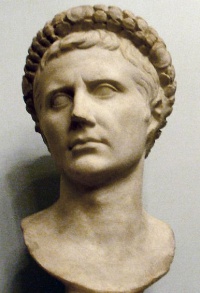Augustus
| Part of the boylove history series |
 |
| Portal:History |
Imperator Caesar Divi Filius Augustus (63 BC – AD 14) is reckoned to have been the first Roman Emperor from 27 BC, when the Roman Senate gave him the titles Augustus and Princeps Senatus.
Public life

He was born in Rome on 23 September 63 BC, the only son and initially namesake of Caius Octavius, Governor of Macedonia, of an equestrian family, and his second wife Atia Balba, niece of C. Julius Caesar. His father died when he was four, after which he was brought up first by his maternal grandmother, then by his mother.
In 46 BC, he was shipwrecked on his way to Spain to join Caesar, by this time childless and Dictator for life. After coming ashore, he continued “over roads beset by the enemy with only a very few companions, … and thereby greatly endeared himself to Caesar, who soon formed a high opinion of his character over and above the energy with which he had made the journey.” [1] He then came so much into his favour that, following Caesar’s assassination on 15 March 44 BC, he was found to have been adopted as his heir in his will, and therefore assumed his names, though still often referred to as Octavian(us).
Mark Antony, once at least he had become Octavian’s principal foe, alleged that his elevation was due to the teenage boy having granted his great-uncle sexual favours, and Antony’s brother Lucius further claimed “that after sacrificing his honour to Caesar he had given himself to Aulus Hirtius in Spain for three hundred thousand sesterces, and that he used to singe his legs with red-hot nutshells, to make the hair grow softer.” [2] However, even Suetonius, whose biographical accounts of the early Roman Emperors are full of salacious gossip, opined that this was too out of character to be more than political slander;[3] little could be more socially damning than for a freeborn Roman male to give himself passively to a man except than to do so for material incentives.
After an initial power struggle with Antony for leadership of the Caesarian party, Octavian allied with him and Lepidus to form the second triumvirate or rule of three to rule Rome. The triumvirs proceeded to “proscribe” more than two thousand hostile senators and equestrians, which meant to outlaw them, confiscate their possessions and execute such as they caught. Amongst them was M. Favonius, in the auction of whose goods, his “puer delicatus” or catamite, Sarmentus, was bought by Octavian. [4]
The triumvirs’ decisive victory over Caesar’s assassins at the battle of Philippi in 42 BC led to a territorial division of the empire with Italy, Gaul and Spain under Octavian’s control, but this soon led to a power struggle. The weak Lepidus was easily dismissed into obscurity, and attempts to patch over the rivalry between Octavian and Antony through a marriage alliance between the latter and the former’s sister proved a failure when Antony eloped with and scandalously married Cleopatra, Queen of Egypt. The ensuing civil war ended with Octavian’s decisive victory at Actium in 30 BC, soon followed by the suicides of Antony and Cleopatra.
Thus left in sole control of the Roman Empire, Octavian maintained the formalities of a republic while effectively gaining a monarchical control symbolised by the Senate’s bestowal in 27 BC of the epithet Augustus, by which he and his successors were thereafter known, though he alone is generally now known by this name. As such, he wielded unchallenged power until his death at Nola on 19 August AD 14 aged nearly seventy-six, having done much in the intervening decades to heal the wounds of decades of civil war and inaugurate badly-needed reforms of many kinds. He was much revered: the then sixth month of the year was renamed August in his honour during his lifetime, and he was proclaimed a god soon after his death.
Private life
Augustus married thrice, all in his youth. He divorced his first wife, Clodia Pulchra, a step-daughter of Antony, before the marriage had been consummated. In his own words, “unable to put up with her shrewish disposition”, he divorced his second wife Scribonia after only a year, the same day, 30 October 39 BC, she gave birth to his only child, Julia. He then “at once took Livia Drusilla from her husband Tiberius Nero, although she was with child at the time; and he loved and esteemed her to the end without a rival.” [5] They had “no children at all, although he earnestly desired issue. One baby was conceived, but was prematurely born.” [6]
Through her marriage to him, Livia exercised unprecedented power and influence for a Roman woman, so much so that she was eventually able to secure the succession of her own son Tiberius rather than his surviving grandson or other blood relations. “When someone asked her how she had obtained such a commanding influence over Augustus, she answered that it was by being scrupulously chaste herself, doing gladly whatever pleased him, not meddling with any of his affairs, and, in particular, by pretending neither to hear nor to notice the favourites of his passion." [7]
Typically of the Roman male of his era, Augustus was as sexually involved with boys as with females. In 30 BC, Antony’s supporter Q. Dellius defected critically to Caesar, as Augustus was then called, giving as his reason that “he had offended Cleopatra at supper by saying that while sour wine was served to them, Sarmentus, at Rome, was drinking Falernian. Sarmentus was one of the little boy playthings of Caesar, such as the Romans call 'deliciae.'" [8] Sarmentus being so well-remembered as Caesar’s catamite twelve years after he was acquired for that obvious purpose in a public auction illustrates how little need to disguise his involvement with boys was felt by a public figure generally careful of his reputation. It should be noted, however, that all the boys Augustus is known to have been sexually involved with appear to have been slaves, a vital distinction between him and his successors Tiberius and Caligula, who offended Roman sensibilities through sexual activity with freeborn boys.
Much of the high public reputation of Augustus’s private life rested on his adoption of the traditional Roman virtue of frugality. The way he perhaps compromised this most was in lack of sexual self-restraint. “He could not dispose of the charge of lustfulness and they say that even in his later years he was fond of deflowering maidens, who were brought together for him from all quarters, even by his own wife.” [9] “And though he was much at table or drink, to a certain degree, in fact, abstaining from sleep, he nevertheless used to gratify his lust to the extent of the dishonour of his public reputation. For he was accustomed to lie among twelve catamites and an equal number of girls.” [10] Taken together, these two judgements illustrate how excessive indulgence in any kind of lust was thought a fault, but whether a man’s sexual partner was a boy or female was a matter of indifference to others as well as, it would sometimes appear, himself.
Augustus’s sexual life is an exemplary illustration of many Roman mores pertinent to pederasty, mores with broad implications for human sexuality in general: the Roman male’s freedom from censure in enjoying sex with slave-boys as well as females when not carried to excess, his propensity to want both without even a marked preference, and the compatibility of indulging in publicly-known pederasty with an exceptionally successful marriage.
References
- ↑ C. Suetonius Tranquillus, Divus Augustus VIII 1
- ↑ C. Suetonius Tranquillus, Divus Augustus LXVIII
- ↑ C. Suetonius Tranquillus, Divus Augustus LXXI
- ↑ Scholiast to Dec. Junius Juvenalis Satires V 3
- ↑ C. Suetonius Tranquillus, Divus Augustus LXII
- ↑ C. Suetonius Tranquillus, Divus Augustus LXIII
- ↑ Cassius Dio, Roman History LVIII.2.5
- ↑ Plutarch, Life of Antony 59
- ↑ C. Suetonius Tranquillus, Divus Augustus LXXI
- ↑ Sextus Aurelius Victor, Epitome de Caesaribus I 22

